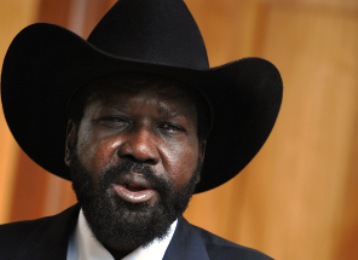President Kiir demands South Sudan officials return stolen money
June 2, 2012 (JUBA) – South Sudan’s President Salva Kiir has written to over 75 former and current government officials directly asking them to account for misappropriated funds.

Over $1 billion, according to the recent country’s Auditor General’s report,
remained unaccounted for between 2005-06, in transfers of oil revenues
from the Government of National Unity – the power and wealth sharing
partnership in Khartoum created by 2005 peace deal – to the autonomous
Government of South Sudan (GoSS) in Juba.
“A letter was sent out last week to over seventy five former and current senior officials in an effort to recover stolen funds,” reads a statement released by the Office of the President.
Most of the stolen funds, according to President, have been taken out of the country and deposited into foreign bank accounts, adding that some of these funds have been used for purchasing properties, often “paid in cash”.
The statement disclosed that Kiir has asked in a written letter sent to eight heads of states seeking their assistance in recovering about $4 billion, which are still unaccounted for, or were simply “stolen,” by unnamed officials well as individuals with close ties to government officials.
These states where the stolen money is supposed to have be transferred to are in Africa, United States, Middle East and Europe, the statement says.
In his letter to the concerned officials, Kiir said: “The people of South Sudan and the international community are alarmed by the level of corruption in South Sudan.”
He emphasised that “corruption has no place in my government”. He also denounced their selfishness while the South Sudanese are suffering from poverty and lack of basic services and infrastructure.
“The credibility of our government is on the line,” the letter of 3 May stresses.
Last week, the Anti-Corruption Commission announced the recovery of $60 million stolen by different officials .
South Sudan has experienced difficult economic conditions since January due to the shut down of oil production as part of a dispute with Khartoum and is in dire need of money. Juba managed to borrow money from some countries but no solution to the oil dispute is on the horizon. Oil revenues accounted for 98% of South Sudan’s income before the shutdown.
“I am writing to encourage you to return these stolen funds (partial or full),” Kiir said, adding that, “If fund are returned, the Government of the Republic of South Sudan will grant amnesty and will keep your name confidential. I and only one other official will have access to this information.”
President Kiir also assured the public of his government’s commitment to probe those involved in corruption-related practices and the desire to hold them accountable through “critical decisions”. The stolen funds, he said, have deprived the country’s citizens of the much-needed heath care, education and other basic services.
Kiir often talks tough on corruption but critics say that he has, so far, not backed this up with action, citing the example that he has not granted the South Sudan Anti-Corruption Commission (SSACC) the power to prosecute officials suspected of corruption. No Southern Sudanese official has been prosecuted for corruption since South Sudan gained self-rule as part of the 2005 peace deal that led to secession last year.
The SSACC is reportedly reviewing 1,600 forms submitted by government officials in response to the declaration of assets call.
Last week, The US Bureau of Democracy, Human Rights and Labor accused South Sudan, in its annual report, of failing to “effectively implement the law, and officials continued to “engage in corrupt practices with impunity.”
The report noted that despite public criticism of corruption by President Kiir, “it was a problem in all branches of government and was compounded by poor record keeping, lax accounting procedures, and the pending status of corrective legislation within the country”.
The statement of the South Sudanese presidency outlined a number of measures
reportedly undertaken by his government in the past six months to combat corruption as well as strengthen transparency and accountability in the world’s newest nation. These include;
- Appointing a new Chairperson of Anti-Corruption Commission
- A letter was sent out to over twenty five (25) current and former
- senior government officials in an effort to recover stolen funds
- Several presidential decrees were issues to strengthen transparency and tackle corruption
- An estimated 500 Declaration of Assets forms were returned by both former and current officials
- The Anti-Corruption Commission handed its final report on the Declaration of Assets to President Salva Kiir late May 2012
- The Government of the Republic of South Sudan has opened a bank account in Kenya so that stolen funds can be returned to this account
- The Anti-Corruption Commission has recovered an estimated $60m from various sources from fraudulent transactions and misappropriation of funds by government institutions
- In January 2012, President Salva Kiir Mayardit sent eight letters to heads of states in Africa, the US, the Middle East and Europe seeking assistance in the recovery of funds stolen by former and current South Sudan officials
- Multiple investigations have been underway since January 2012 in an effort to recover stolen funds.
(ST)
